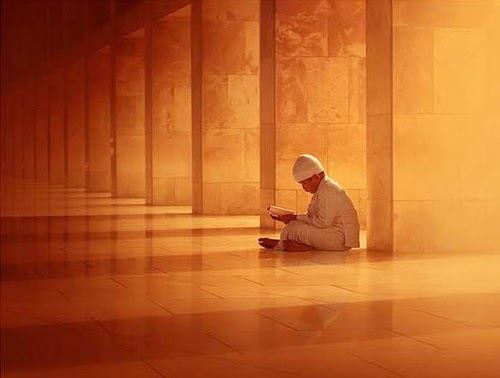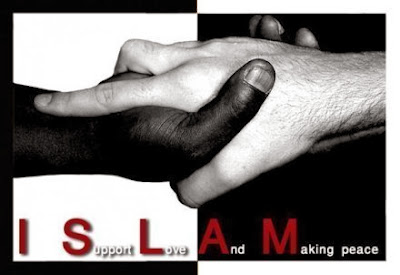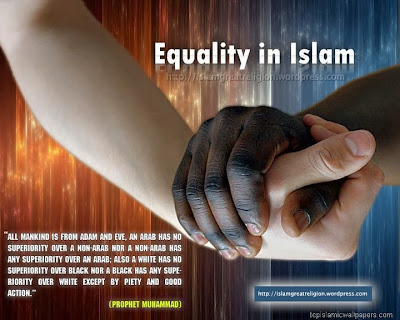
Be Smart on Choosing Friend! True Friendship will lead you to Jannah… NOT to Jahannam!

If you haven’t felt Allah’s love,
you don’t know anything about love.













And whenever you give your word, say the truth [al-An'aam 6:152]
And seek help in patience and prayer [al-Baqarah 2:45]
And speak good to people [al-Baqarah 2:83]
And fulfil the Covenant of Allaah when you have covenanted [al-Nahl 16:91]
Verily! Allaah commands that you should render back the trusts to those to whom they are due [al-Nisa' 4:58]
And let not your hand be tied (like a miser) to your neck, nor stretch it forth to its utmost reach (like a spendthrift) [al-Isra' 17:29]
Eat and drink, but waste not by extravagance [al-A'raaf 7:31]
And take a provision (with you) for the journey, but the best provision is al-taqwa (piety, righteousness) [al-Baqarah 2:197]
And whosoever fears Allaah and keeps his duty to Him, He will make a way for him to get out (from every difficulty) [al-Talaaq 65:2]
And whosoever puts his trust in Allaah, then He will suffice him [al-Talaaq 65:3]
He who obeys the Messenger has indeed obeyed Allaah [al-Nisa' 4:80]
By no means shall you attain al-birr (righteousness) until you spend (in Allaah’s cause) of that which you love [Aal 'Imraan 3:92]
Allaah (Alone) is Sufficient for us, and He is the Best Disposer of Affairs (for us) [Aal 'Imraan 3:171]
And walk not on the earth with conceit and arrogance [al-Isra' 17:37]
And turn not your face away from men with pride [Luqmaan 31:18]
And be moderate (or show no arrogance) in your walking, and lower your voice [Luqmaan 31:19]
And give not a thing in order to have more (or consider not your deeds of obedience to Allaah as a favour to Allaah) [al-Muddaththir 74:6]
“O ye who believe! Do not squander one another’s wealth in vanities, but let there be amongst you traffic and trade by mutual good will.” Qur’an:4:29
“When my servants ask thee (O, Muhammad) concerning Me, tell them I am indeed close (to them). I listen to the prayer of every suppliant when he calleth on Me.” Qur’an:2:186
“God does not forbid you to be kind and equitable to those who have neither fought against your faith nor driven you out of your homes. In fact God loves the equitable.” Qur’an:60:8
“And in their (the earlier prophets) footsteps We sent Jesus the son o Mary, confirming the law that had come before him. We sent him the Gospel, therein was guidance and light and confirmation of the law that had come before him, a guidance and an admonition to those who fear God.” Qur’an:5:46
“Whoever recommends and helps a good cause becomes a partner therein, and whoever recommends and helps an evil cause shares in its burdens” Qur’an:4:85
“Be quick in the race for forgiveness from your Lord, and for a Garden (paradise) whose width is that of the heavens and of the earth, prepared for the righteous – Those who spend (freely), whether in prosperity or in adversity, who restrain (their) anger and pardon (all) men – for God loves those who do good.” Qur’an:3:133-134
“Whoever works righteousness, man or woman, and has faith, verily, to them will We give a new Life, a life that is good and pure, and We will bestow on such their reward according to the best of their actions.” Qur’an:16:97
The parable of those who spend their wealth in the way of God is that of a grain that sprouts into seven ears, each bearing one hundred grains. God gives manifold increase to whom He wishes. God has boundless knowledge. Those who spend their wealth in the cause of God, and do not follow their charity with reminders of their generosity or injure the feeling of the recipient, shall get their reward from their Lord; they shall have nothing to fear or to regret.Kind words and forgiveness are better than charity followed by injury. Qur’an:2:261-263
قُلْ لِلْمُؤْمِنِيْنَ يَغُضُّوْا مِنْ أَبْصَارِهِمْ وَ يَحْفَظُوْا فُرُوْجَهُمْ, ذَلِكَ أَزْكَى لَهُمْ.“Say to the believing men that: they should cast down their glances and guard their private parts (by being chaste). This is better for them.”
قُلْ لِلْمُؤْمِنَاتِ يَغْضُضْنَ مِنْ أَبْصَارِهِنَّ وَ يَحْفَظْنَ فُرُوْجَهُنَّ...“Say to the believing women that: they should cast down their glances and guard their private parts (by being chaste)…”
وَ لاَ يُبْدِيْنَ زِيْنَتَهُنَّ إِلاَّ مَا ظَهَرَ مِنْهَا وَ لْيَضْرِبْنَ بِخُمُرِهِنَّ عَلىَ جُيُوْبِهِنَّ...“...and not display their beauty except what is apparent, and they should place their khumur over their bosoms...”
يَا أَيُّهَا النَّبِيُّ, قُلْ لأَزْوَاجِكَ وَ بَنَاتِكَ وَ نِسآءِ الْمُؤْمِنِيْنَ: يُدْنِيْنَ عَلَيْهِنَّ مِنْ جَلاَبِيْبِهِنَّ...“O Prophet! Say to your wives, your daughters, and the women of the believers that: they should let down upon themselves their jalabib.”
 |
| Add caption |
 |
| Islamic Sharia Law |
 |
| Sharia in Islam |